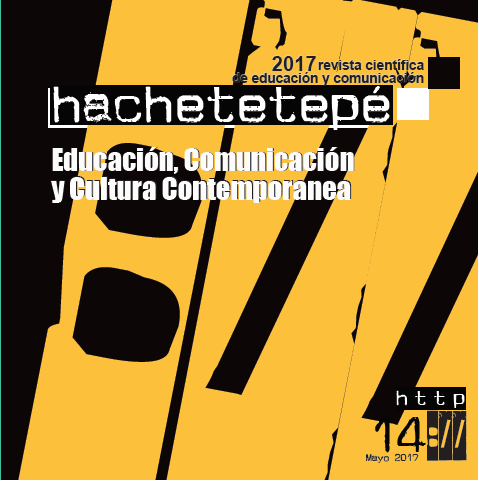ICT and collaborative learning for today's education. an autobiographical case blog of classroom to improve coexistence in early childhood education
Abstract
In this article I try to explain my personal experience related to how information and communication technologies have helped me opening a new way of communication and collaboration with families in educational contexts, offering them a resource for the ordinary life for their children development. All begins with a personal experience, and I consider that the best way to write about it is the autobiographic method, through which all feelings and emotions flow better than with other methods which will remain undistinguished. I pretend to reach the reader telling the truth about this experience, turning my first person narration in the center of the story. This enfoque has gained day by day more relevance, because i t allow us -through stories- give to know and interpretar those realities which we pretend to observe, pudiendo afirmar que this enfoque goes far beyond one simple data recollection, because through life stories we can go in depth in human experience emotional content which, in some occasions, remains hidden by those more -as pretended- objective methods.
Keywords
Downloads
How to Cite
License

This work is licensed under a Creative Commons Attribution-NonCommercial-NoDerivatives 4.0 International License.
Those authors who have published with this journal, accept the following terms:
- They will retain their copyright and guarantee the journal the right to first publication of their work, which will simultaneously be subject to the Creative Commons Attribution License . They may be copied, used, disseminated, transmitted and publicly displayed, provided that the authorship, url, and magazine are cited, and are not used for commercial purposes. No derivative works are allowed.
- They may adopt other non-exclusive license agreements for the distribution of the published version of the work (e.g., deposit it in an institutional telematic archive or publish it in a monographic volume) provided that the initial publication in this journal is indicated.
- Disseminate your work through the Internet (e.g., in institutional telematic archives or on your website) once the manuscript is accepted, which may lead to interesting exchanges and increased citations of the published work. (See The effect of open access).
Hachetetepé. Scientific journal of education and communication does not charge a fee for the submission of manuscripts or for the publication of its articles.
References
Amar, V. (2014) (Coord.). Recuperar y compartir. La memoria de la escuela. Granada: GEU.
Amar, V. (2015) (Coord.). Miradas y voces de maestros jubilados. Una investigación desde la narrativa. Barcelona: Octaedro.
Bolívar, A. y otros (2001). La investigación biográfica-narrativa en educación enfoque y metodología. Madrid: Muralla.
Cabero, J. (2007) Las necesidades de las TIC en el ámbito educativo: oportunidades, riesgos y necesidades. Tecnología y comunicación Educativas, 45; 5-19
Cabero, J. y Barroso, J. (2013). Nuevos escenarios Digitales: las tecnologías de la información y la comunicación aplicadas a la formación y desarrollo curricular. Madrid: Pirámide.
Cabero, J. y Barroso, J. (2015). Nuevos retos en tecnología educativa. Madrid: Ed Síntesis.
Cabero, J. y Marín, V. (2014). Miradas sobre la formación del profesorado en tecnologías de información y comunicación (TIC). Enl@ce Revista venezolana de Información, Tecnología y Conocimiento, 11 (2), 11-24.
Carbonell, J. (2015). Pedagogías del siglo XXI: Alternativas para la innovación educativa. Barcelona: Octaedro.
Castellano Vega, J. J. (2011). Las tic en la educación. Madrid: Anaya Multimedia.
Chárriez Cordero, M. (2012). Historias de vida: Una metodología de investigación cualitativa. Revista Griot, 5(1).
Flick, U. (2004). Introducción a la investigación cualitativa. Madrid: Morata.
Haro, J. (2010). Redes sociales para la educación. Madrid: Ediciones Anaya Multimedia.
Hernández, A. y Olmos, S. (2011).Metodologías de aprendizaje colaborativo a través de las tecnologías. Salamanca: Ediciones Universidad de Salamanca.
Kvale, S (2011). Las investigaciones en investigación cualitativa. Madrid: Morata.
Llorente, Mª del C., Román, P. y Romero, R. (2009). Tecnologías en los entornos de infantil y primaria. Madrid: Síntesis.
Meloni, J.C. (2006). Blogger. Madrid: Anaya Multimedia.
Molina, M. y Ramalho, A. (2016). Las tic como apoyo a la tutoría en la educación infantil. Una propuesta para la colaboración. Dedica. revista de educação e humanidades. 9; 55-74
Orihuela, J.L. (2006). La revolución de los blogs. Cuando las bitácoras se convirtieron en el medio de comunicación de la gente. Madrid. La esfera de los libros.
Pujadas, J. (1992). El método biográfico: El uso de las historias de vida en las ciencias sociales. Madrid: CIS.
Rivas, J. I. y Herrera, D. (Coord.) (2009). Voz y educación. La narrativa como enfoque de interpretación de la realidad. Barcelona: Octaedro.
Rivas, I. (2014). Narración y realidad. Otra mirada de la escuela. En Amar, V. (2014) (coord). Recuperar y compartir. La memoria de la escuela. Granada: GEU; 9-11.
Rodríguez, G ., Gil, E. y García, E. (1996). Metodología de la investigación cualitativa. Málaga: Aljibe.
Rull, L y Valdina, R. (2012). Wordpress para dummies. Barcelona. CEAC.
Ryan, G.W. y Bernard, H.R. (2003) Data management and analysis methods. En N.K. Denzin y Y.S. Lincoln (eds.). Collecting and interpreting qualitative materials. (2a ed.). Thousand Oaks, CA: Sage.
Sancho, J. (2014). ¿Son más listos o más estúpidos? ¿Dónde está la educación? Revista hachetetepé, 9; 71-80.
Zayas, F. (2007). Mis primeras experiencias con los blogs en el aula. Quaderns digitals. Revista de nuevas Tecnologías y Sociedad, 42; 1-10






